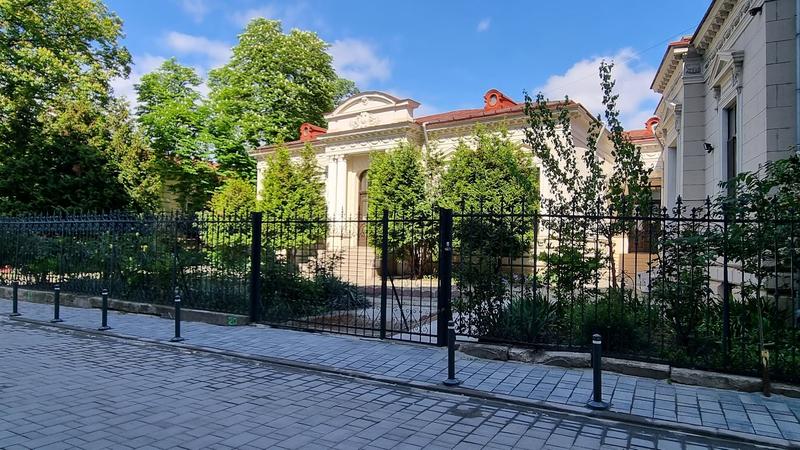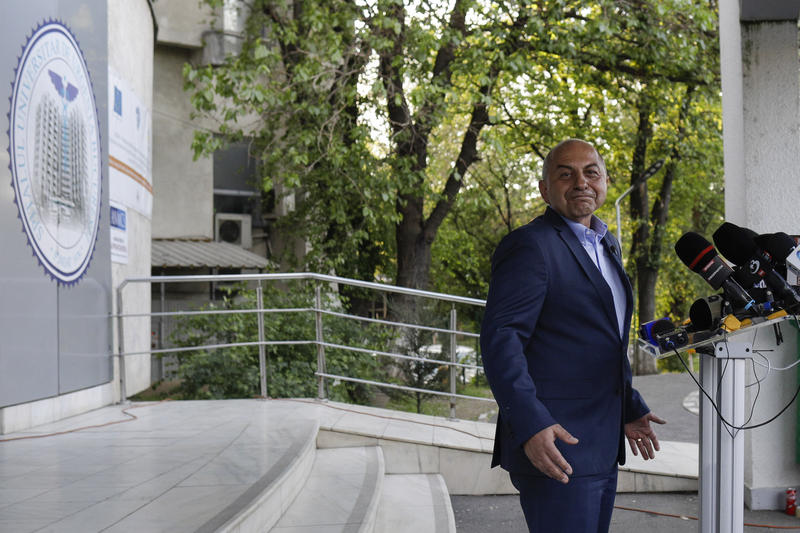- Author Mark A. Meyer is Chairman, Romanian-American Chamber of Commerce
Just as the Romanian government cannot take back a farm that was restituted to the family from whom it was stolen without paying its fair value, so it cannot confiscate another family's right to receive a different farm in restitution by payment of a mere pittance of its true value. But that is precisely what the Romanian Government contemplates doing through a draft law that would confiscate 85% of the property rights of thousands of victims of Romanian communism and fascism - inviolable rights that were granted to them twelve years ago by law. The Draft Law proposes to take 85% of the value of all pending claims by owners of properties that were seized by Romania's Communist government between 1945 and 1989 without compensation. It is proffered in total disregard of Romania's constitutional provisions prohibiting such acts and in violation of Protocol One of the European Convention of Human Rights to which Romania is a signatory and which recognizes property rights as human rights.
The Draft Law stems from the European Court of Human Rights ("ECHR") pilot judgment against Romania in Maria Atanasiu et. Alt. v. Romania, dated October 12, 2010, in which the ECHR gave Romania 18-months, ending on July 12, 2012, to find and implement a coherent, equitable and effective mechanism for compensating the victims of communism. Instead, the government now proposes to confiscate virtually the entire value of the rights that were given to the victims of communism by law in February 2001. While the ECHR decision contemplates reasonable limitations on restitution awards, that determination does not permit confiscation of actual property rights in violation of the Convention and the Romanian Constitution. Indeed, Article 44 of the Romanian Constitution enshrines the right of private property which specifically includes obligations incurred by the State and guarantees them against expropriation except on grounds of public utility established according to law and then only upon just compensation paid in advance. Permissible limitations on restitution rights are never to the value of the right itself, but to the method by which compensation might be obtained and a reasonable time in which to pay it or deliver it. No civilized system of law condones the willful appropriation of a person's property without fair, equitable and just compensation as a justifiable limitation on property rights - and Romania is no exception.
Make no mistake about it -- what is proposed in the Draft Law is as loathsome and shameful as the brutal takings, cruelties and exploitations of the communist era. Having provided the victims of communism with a right to full and fair compensation for the abusive acts of past governments, Romania's Constitution and its obligations under Protocol One of the European Convention on Human Rights prohibit it from expropriating such right in the manner proposed by the Draft Law.
From Whence Did It Come?
The government justifies the expropriations in the Draft Law as warranted by its financial difficulties. News reports have government officials admitting that the Draft Law creates an injustice but stating that this is the only way to deal with the matter because of a purported cost in excess of Euro 16 billion. Their basis is false on three grounds -- the Government's cost estimates are grounded on bogus numbers; there are several fair and legal ways to deal with actual financial issues, which we offer below; and Romania cannot legally confiscate 85% of the value of any form of property without fair compensation.
The inflated cost estimates of restitution arise from adding thousands of claims that were filed in 2001 but which have never been pursued thereafter. These claims will remain dormant forever because there are no documents to substantiate them. They can and should all be dismissed. That leaves the tangible claims that have been legitimately in process for 12 years. But the government has even inflated those numbers by adding the value of the properties that could be restituted in-kind, such as those to the Catholic Church, but for which the government would not have to pay anything if they were just returned without any cash burden attached. Indeed, the real remaining cost of restitution in the equivalent has been privately estimated by the leadership of the Ministry of Finance to be between €2 billion and €3 billion. That amount can be paid over a period of years in cash or in shares in a new Property Fund or in newly privatized state companies - as suggested in this article.
From where did the illegal notion of a 15% cap on restitution arise? The finger can be pointed at Poland. In appalling contrast to prior Romanian governments in the first decade of the millennium, Poland failed to offer restitution to the victims of its communist regime. Its leaders now speak of offering a cap on restitution of only 15% of the value of what was taken from its citizens. As disgraceful as that may sound, Poland can do it; Romania cannot. Why -- because Poland, unlike Romania, has never acknowledged its wrongdoing and never afforded its victims any property right to the return of what it stole. In sharp contrast, Romania through Law 10/2001, gave its victims the right to full compensation in-kind or equivalent thereby creating a property right that claimants who properly filed have been actively pursuing for 12 years. It is a property right that is protected under the European Convention and by the Romanian Constitution. It cannot be taken away without fair and complete compensation. But in Poland, since the European Convention is not retroactive and the country has not done anything to provide restitution for communist confiscations that were legal at the time that they occurred, the Polish government can do whatever it likes. Romania cannot. Romania must respect in full the property rights that it granted twelve years ago.
And that raises another question which Romania cannot avoid. Why has it taken 12 years for victims to obtain restitution without success? Who is to blame for this unreasonably long period? As no one disputes, the answer lies in the indolence of the Romanian government - a bureaucratic lethargy (and bad faith in some instances) for which it alone is to blame, but for which it now seeks to unjustly penalize the victims.
In-kind restitution is no longer available
The Draft Law totally eliminates the in-kind return of property stolen by past governments. This means that any property that could actually be returned will not be given back, but instead would be compensated by equivalent - meaning cash - but only for 15% of its real value. There has not been a serious argument made by anyone to support the exclusion of in-kind restitution. The explanation offered by the Ministry of Finance is that restitution in-kind in full would represent discrimination against those claimants who cannot obtain the same - thereby making a ploy a pretext for the exercise of very real discrimination against an entire class of claimants. Restitution by equivalent is and should always be available ONLY in cases where in-kind restitution is no longer possible. Forcing claimants to receive compensation for real property which still exists and can be restituted in-kind is not only a breach of their ownership right, but represents a second nationalization for those who have already been deprived of their property in the past by the communist regime.
Compensation limited to a 15% cap and payable in 10 years
In the current form of the Draft Law, claimants are limited to a 15% cap on the value of their property rights, payable in 10 years. This 15% cap does not represent a real and actual mechanism of compensation as required by the ECHR in its pilot judgment -- the cap is merely a limitation on what otherwise would be the total theft of restitution property rights by the Romanian State.
Moreover, the payment of this meager amount in 10 years is tantamount to claimants receiving almost nothing from the state for their confiscated real estate because this payment would occur at a minimum of 22 years after the claimants first exercised their property rights and at a time when most of them will be long dead. The explanation of the Ministry of Finance is that the Romanian state lacks the required funds for payment of compensation - but while this might have been an acceptable excuse to the regime of Nicolae Ceausescu, it is completely unacceptable in a democratic society where ownership rights are guaranteed and discrimination is sanctioned. Needless to say, if lack of funds is the main argument for creating an unreasonable and inequitable cap, the state should also consider the huge amounts which Romania will be obliged to pay to claimants as damages in the myriad of litigations that will follow at the ECHR.
Besides violating the right of property established in Article 44 of the Romanian Constitution through the taking of 85% of the value of the claimants' rights without payment, the Draft Law's cap on compensation also violates Article 16 ("equality of rights") of the Constitution, which states that citizens are equal before the law and the public authorities without privileges and without discrimination. Under Article 1(2) of Ordinance no. 137/2000, any form of discrimination regarding "an ownership right" is prohibited. The Draft Law arbitrarily changes the principle of full compensation and does so by discriminating between those who were granted restitution and those whose properties are still to be restituted.
The current law provides for the principle of full compensation for both types of restitution, whether in-kind or by compensation, and so claims that have already been processed have been settled in full. The Draft Law would create an obvious discrimination between the claimants who already received compensation in full and those whose claims are to be settled after the adoption of the Draft Law, who will have 85% of the value of their rights unilaterally taken without compensation - and the rest paid over 10 years. It is probable - as the ECHR states in the pilot judgment, and the Romanian Government admits - that decisions have not yet been issued in many restitution files NOT by the fault of the claimants but as the fault of the National Authority for Property Restitution ("ANRP"), which has constantly delayed the issuance of decisions in the restitution files. The Draft Law would make those hapless claimants suffer for the state's incapacity to make its institutions function properly.
While installments might be provided with appropriate and legal limitations, the Draft Law permits the compensation already limited to a maximum of 15% of the value to be paid during a term of 10 years, in annual installments. The amounts payable as compensation do not bear any interest, which is why, given the long period during which they are to be paid and the continuing inflationary process, claimants would most likely end up being paid less than even the meager amount to which they would be entitled under the Draft Law. Such limitation plainly violates the human rights of the claimants.
Applicability of the draft law to claimants whose claims have already been evaluated
Inexplicably, the Draft Law appears to apply to claimants whose claims have already been evaluated (article 8, paragraph 1 of the Draft Law). The Draft Law fails to recognize that besides final and irrevocable court decisions, there are restitution decisions issued by the Authority for State Asset Recovery ("AVAS") that have already been evaluated, but were sitting for months at ANRP without being processed due to ANRP's institutional dysfunctionality. These dysfunctions have been cited by the ECHR as one of the main grounds for the issuance of the pilot judgment against Romania. Indeed, the Romanian Government itself has acknowledged these problems, mentioning through its spokesman that "there are extremely numerous suspicions in relation to what has happened at ANRP during the past years". In such context, why should claimants be penalized for ANRP's failure to function properly or for the potentially questionable practices now under investigation?
The Draft Law as applied to these claimants violates Article15 of the Romanian Constitution concerning the non-retroactivity of the law. For example, the Draft Law appears to apply to claims which were already evaluated but where no restitution titles were yet issued (the language as drafted requires clarification). The principle of non-retroactivity is obviously breached in such cases where decisions have already been issued by AVAS, but are pending at ANRP. Indeed, such decisions contain, in all cases, an evaluation of the property with the amount to which the claimants are entitled as compensation. ANRP is not permitted to change the amount of compensation, but merely to verify whether the claim is fully documented and issue the restitution title providing the same amount of compensation as set forth in the AVAS decision (unless, of course, ANRP can prove that the evaluation was made in breach of the law). In these cases, the theory of "already acquired rights" is also applicable, meaning that the state cannot take away a right which has already been recognized and quantified and has already become the claimant's property.
The Draft Law's breach of the constitutional provisions in Articles 15 and 16 of the Romanian Constitution is supported by Decision no. 830/2008 of the Constitutional Court of Romania, which declared as unconstitutional certain provisions of Law no. 247/2005 amending Law 10/2001. More specifically, according to Law 10/2001, certain claimants were entitled to in-kind restitution while, after the then-proposed amendments were adopted, the same claimants were entitled only to compensation. Most significantly, the Constitutional Court ruled that the change of the compensation mechanism triggered a breach of Articles no. 15 and 16 of the Romanian Constitution in that it created discrimination between those claimants who had already been compensated and those who were to be compensated under the proposed amendment. In addition, the proposed amendment breached the principle of non-retroactivity of the law, as it would have amended the legal rights of the claimants to which they had become entitled after the filing of the restitution claim. Consequently, the respective proposed articles of Law 247 were annulled.
If restitution decisions already issued by AVAS fell under the ax of the Draft Law, it would contravene the principle of acquired rights, as well as the principles of non-discrimination and non-retroactivity of law. Therefore, article 8, paragraph 1 of the Draft Law should make a reference to the "amount provided in final and irrevocable court decisions, in restitution titles … or, as the case may be, restitution decisions issued by AVAS …". If so amended, the Draft Law would include all claims that have already been evaluated, without discriminating against those who did not obtain a title because of ANRP's indolence, lack of action, or malfeasance. In addition, the 12-year term mentioned in the same article is excessive and unwarranted.
The 60-day term in which claimants must file additional documentation in support of their claims
The 60-day term provided in Article 11 of the Draft Law is not only unrealistic, but penal in nature. Claimants are unable to submit additional documentation in support of their files not by their fault, but because of the state institutions' incapacity to function properly. Despite claimants' repeated requests for documents, state archives refuse to release them. Why should claimants be sanctioned for the state's incapacity to establish and implement a functional mechanism?
60-months to process claims which are currently pending before ANRP vs. 36-months for processing claims to be filed after the Draft Law becomes effective
This undoubtedly represents discrimination between claimants whose claims are currently pending before ANRP versus those whose claims will be filed after the Draft Law becomes effective.
Conclusion
The notion that Romania can rescind property rights that it rightfully gave to all victims of communism twelve years ago without fair compensation is an anathema to its own laws and to the principles of justice and decency to which Romania seeks to adhere. Reasonable limitations on the delivery of future restitution awards - not on their actual value - can be contemplated. Here are several alternatives for consideration by the government to ameliorate the actual financial difficulties it faces which all contemplate the continuation of in-kind restitution:
- Creation of a second Property Fund. This could be done quite quickly, since it would be created through a Government Decision. The assets of such fund would consist of shares that the Government owns in listed companies.
- Granting compensation in the form of shares in listed companies in which the state maintains an interest.
- Payment through state bonds with a face value that reflects the actual value of a bond payable at a future date.
- The grant of compensation through state-owned land, subject to proper evaluation.
- Payment of cash in installments would be acceptable if made over a reasonable period of time and, obviously, with no cap. The installments must be subject to interest and inflation.
- With the exception of claims that have already been evaluated, claimants awaiting cash compensation could be provided with the choice of taking a capped amount of money immediately or delayed payment of the full amount, not to exceed 7 years, in equal installments plus interest at the prime rate and subject to inflation.
The Draft Law may well be dead on arrival at Parliament, but those who thought that they could perpetrate such an act are still very much alive. It must be made clear to them that they can neither take back restituted property nor the right to receive such property. It's that simple!
Finally, it should not go unsaid that the government's disregard of the right of property has shaken foreign investors. As word of the contemplated confiscations spread, investors understood that if such property rights can be seized without just compensation, then so can other forms of property such as security interests in current or former state owned companies. The shudder of dread that this has brought was slightly dissipated by comments from the government that it was "re-thinking" the matter. Pursuing any form of unjust taking will serious harm Romania's efforts to induce and keep foreign investment in the country. Once again, Romania is on the precipice of turning a great and noble deed into a shameful and despicable legal morass out of which it cannot recover other than humiliated and further impoverished.


















